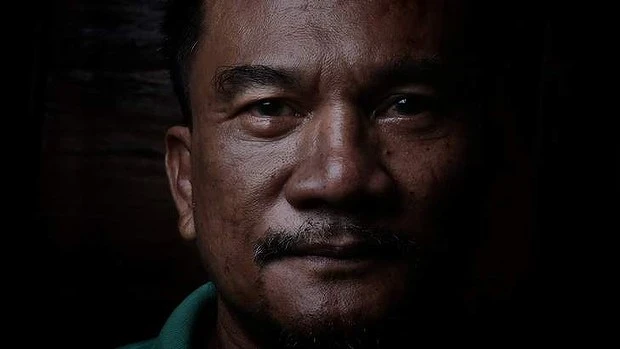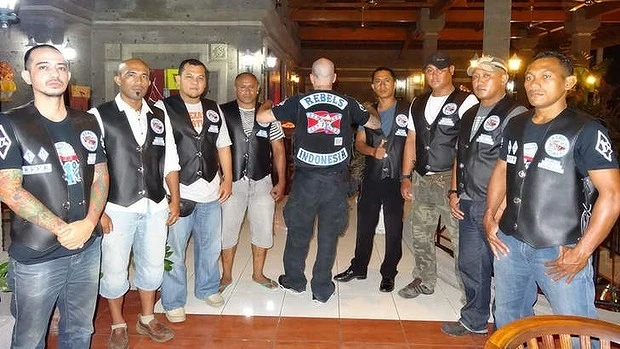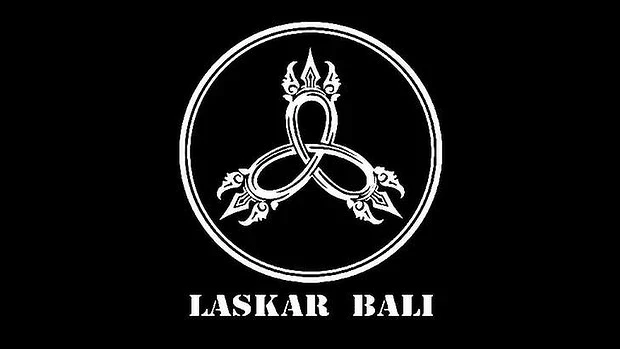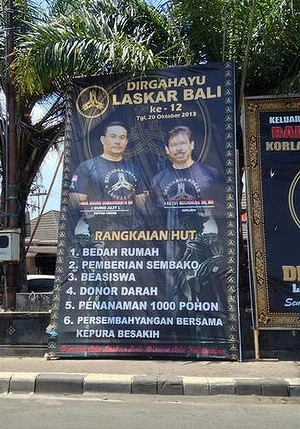
The soft sunny climate and radiant smiles of the Balinese hide the dark side of life on the paradise island – the activities of armed groups attacking foreigners.
To surrender or withstand?
A few months ago, armed individuals invaded Juan Delgado's house, threatening to kill him. Fearing for his life, Delgado decided to sell his property in Bali and hand over $120,000 to the bandits. A similar attack targeted Suzie Johnston. Despite the threats, she intends to keep her villa in Canggu and refuses to give in. Johnston, a widow living alone in the house built with her late husband, faced an assailant who wanted to buy her property. After her refusal, he hired thugs. Suzie Johnston sought help from the police, and legal proceedings will soon begin. To win the case, she will need all her willpower and luck.
Johnston is aware of about a hundred attempts to seize the property of Bali expatriates. She and Delgado encountered one of the darkest sides of the island: the activities of organized gangs known as "Preman" (literally "free people"). These steroid-pumped mafiosos have adopted the ritual Hindu weapon – Shiva's Trident – as their symbol. They ride stolen motorcycles and engage in street fights in Bali at night.
For the Preman gangs, armed attacks on foreigners are a lucrative business. However, this is just one of their sources of income. Bandits often commit robberies near Balinese nightclubs and extort money from businessmen, threatening violence. In Kerobokan prison, they beat foreigners and push them into drug use.
Band leaders often hold important positions in public organizations and administration. One Balinese Preman group is known to be connected with an Australian motorcycle gang operating in the profitable tourist segment. These gangs provided security during Barack Obama's visit to Bali and campaigned in support of the provincial governor and the losing presidential candidate Prabowo. You can recognize group members by their posture: a smile, a downward gaze, hands crossed on the chest – as seen on campaign posters across the island.

Dangerous Nominees
In 2001, Juan Delgado married an Indonesian woman, Agus, in his native Spain. After a few years, the couple bought a house in Bali for personal relaxation and as a profitable investment. Foreigners are prohibited from owning property in Indonesia, although demand for real estate is growing every year. Delgado's deal was official thanks to his wife's citizenship. In October 2009, the couple moved to Bali permanently. Delgado left his job in Barcelona, sold his apartment, and bought four more houses in Jimbaran. All documents were registered in Agus's name.
Many Australians, following the advice of local lawyers and real estate agents, use Indonesian nominees to purchase property. Often, these are staff members in their homes or the homes of their friends, and the nominee's name is specified in the property contract.
Delgado faced the consequences of this approach in 2012. After a quarrel, Agus fled, taking valuables with her. "I didn't find two land certificates and the cash we kept at home. The bank account in Spain was also empty," he shared.
Emotionally crushed, Delgado decided to give two out of the five houses to Agus. However, events continued to unfold. Without his knowledge, Agus took a $55,000 loan, using the houses as collateral, and spent it all on designer clothes, jewelry, and overseas trips. When the money ran out, she couldn't repay the loans. Instead, she hired thugs.
Mafiosos settled in one of Delgado's remaining houses. Initially, he didn't suspect Agus's involvement. It became clear when Delgado was checking his properties. "No one had lived in two of the houses for some time, but it turned out that someone had taken over one of them," he recalled. "I saw Preman – two or three of them – and called the police. When we entered, I noticed a samurai sword and a pistol with one of them." The police did little: "They said they couldn't evict people from the house because it was under legal dispute."
Less than a week later, Preman occupied the second house, then attempted to enter the third. "I went there, but they drove me away," says Juan.
Descendants of the "Bali Army"
The attackers on Delgado wore insignia of the new Balinese gang, Satria Bali ("Knights of Bali"). This is one faction of the oldest and most well-known group, Laskar Bali ("Bali Army"). Both use the Trident as their symbol – a weapon of the Hindu god Shiva, who cut off the head of another god, Ganesha (ironically, the god of success).

Laskar Bali was established in 2002 by leaders of the influential Pemecutan family – hereditary rajahs, or kings, in one of the tourist areas of southern Bali. Family members bear a tattoo on their chests in the form of a horsewhip. Members of Satria Bali tattoo the Trident of Shiva on the webbing between the thumb and forefinger of their right hand.
Laskar Bali was founded as a kind of Hindu defense league after the first bombings in Bali organized by Muslim extremists. Agung Ari, the stepbrother of Gung Alit – the godfather of the gang – explained that the gang operated then under the cover of a person from the Indonesian government whose name cannot be mentioned. They assisted in tracking down terrorists.
There are two other major offshoots of Laskar Bali. Baladika Bali is usually associated with ancient Hindu warriors of divine origin. PBB ("Unified Balinese Youth") is also oriented toward Hindu values and is subordinate to a member of the national parliament, Nyoman Dhamantra.
In addition to local groups, gangs from Java and Sumatra, including Pemuda Pancasila, are also active in Bali.
When asked about the nature of Laskar Bali, Agung Ari responds that it resembles a cultural association with employment: "We formed it, wanting to create jobs for the people of Bali. It initially included ordinary people genuinely concerned about the island's security."

In society, the gang created chaos and committed crimes. Gung Alit himself was in prison for a murder in a karaoke bar in 2003. In his absence, a power struggle began. One of the contenders, Wayan Kayun, was killed. "Laskar Bali is undoubtedly the most ruthless of the gangs on the island," says a longtime observer.
In October 2013, a minor dispute between two men escalated into a bloody battle between Laskar Bali and Baladika in West Denpasar. Cargo Street became a virtual combat zone for hundreds of adversaries. Some were armed with swords and tridents. It took an equal number of soldiers and police, seven trucks, and two water cannons to stop the bloodshed and restore order.
The same two gangs, hired by opposing sides in a property dispute, engaged in a fight in the Sesetan area (Denpasar), forcing the police to use tear gas. Children from a nearby school were among the casualties.
Clearly, the gangs are active inside Kerobokan Prison as well. Almost all Indonesian inmates are members of one of the groups involved in extortion and control drug supplies. "Everyone joins or is forced to join. Gangs recruit and essentially zombify young guys. They are interested in the growth of the gangs," says one prisoner. "Even the guards are unofficial, and some are official members of the gang."
In prison, each gang has its own management territory – one or more cell blocks. The gang leader is the block leader. "When a new person comes to the block, they sell him drugs or beat him," reports a source, adding that heroin, ice, ecstasy, marijuana, and sometimes cocaine are always available. "Laskar Bali controls Sabu as well. If someone tries to bring Sabu from the outside, they beat and confiscate it. For Indonesians, it is the most popular drug."
Beatings and random murders happen here often. In February 2012, chaos reigned in the prison for two nights, sparked by old disputes between two gangs. When asked about prison connections, Ari, while evasive, responds: "I don't say whether they exist or not. But once in prison, a person is likely to prefer to join Laskar Bali to protect themselves."
Before being sentenced to nine years in prison for the murder of Ajik Barak, Barak served in the armed forces. He joined Laskar Bali in Kerobokan prison in 2005. After his release, he was promoted to regional captain in Badung. This is a large area that includes hot tourist spots in Bali. "We ensure security in prison," says Barak. "Laskar Bali helps control the situation because we work with officers. We are always for peace. Wherever Laskar is, there is peace."
According to him, outside the prison, Laskar Bali is a community group whose members donate blood, plant trees, and help poor people repair their homes. Barak agrees that the group is involved in settling property disputes but assures that they will never do anything unjust: "I personally review cases. Mediation, dialogue is the best way. If my client is right, I will fight in any way to defend him. If people hire me, I am available 24 hours... If it turns out that my client is not right, even if he considers himself so, well, I'll find a way to influence him. I have secret methods." Barak did not specify what these methods are: muscular men or weapons.
After the disorders in 2013, many Balinese gangs surrendered their weapons. Barak says that up to four thousand weapons were handed over to the police, claiming that previously they were only used for self-defense. He acknowledges that some members of Laskar Bali use violence but insists that it has nothing to do with the group itself: "It's just individuals, often young people who want to show off."
Leader Agung Ari also denies Laskar Bali's involvement in gangsterism. When asked to comment on the actions of group members – seizing others' property, illegally invading private territory – which characterize them as a mafia, he responds: "Of course, such things happen. Some people do unethical things, but these are individuals, it has nothing to do with Laskar Bali."
When Delgado was at the center of events, he observed that the authorities were either frightened of the gang or supporting it. According to Indonesian laws, no member of the military, police, or legal apparatus is allowed to be a part of the "civil police." However, Delgado believes that gangs and the police are closely connected.
For a Westerner, it's challenging to grasp how deeply gangs penetrate Indonesian society and politics. They are considered "ormas" – social groups and operate under the cover of well-known organizations, such as Greenpeace. The so-called civil police is more openly aligned: its members often dress in militarized uniforms, carry regalia, and bear arms. They work at all hours and enjoy the patronage of political parties.
Anthropologist Lee Wilson from the University of Queensland says, "This is how politics is done in Indonesia... Physical strength and effectiveness form the basis of popularity."
Benny Mokalu, the chief of police in Bali, assures that gangs often prove useful in his jurisdiction: "Who said that 'ormas' disturbs society? Nothing like that. They help. But, like in any other organization, there are people in 'ormas' involved in criminal cases." Shifting responsibility to individual members is the same tactic used by gang leaders.
Now, those who rule the streets aspire to enter official power. In the National Parliament elections in April 2014, Agung Ari himself was a candidate, though he did not win. However, another high-ranking member of Laskar Bali, Agung Sumedi, emerged victorious.
Laskar Bali has long supported the administration and Governor I Made Mangku Pastika, a former police officer who controversially won a second term last year. Ketut Rochineng, the general secretary of the administration and head of the Bali government agency responsible for hiring all public sector employees, is also a member of the gang. These are lucrative positions: candidates often offer bribes to secure their positions.
Anthropologist Lee Wilson says that gangs continue to grow in Indonesia because of the high level of poverty, widespread corruption, and the absence of state services. They provide social support to the poor, give them a voice in parliament and at the local level. This is particularly evident in Bali. Almost everywhere, the police are corrupt, with limited resources and poor training.
Wilson believes, "It's easy to justify the existence of these groups if you evaluate them as a means to protect the community, especially from the 'threats' to Bali from outsiders." Even when Delgado and Johnston were attacked, gang representatives claimed that, for their own protection, they should pay. Hundreds of foreigners, including Australians, currently want to acquire property in Bali's rapidly developing market through local nominees. However, I bet buyers aren't shown photos of gang members who might appear at their doorstep and demand the keys.
The names in the article have been changed.
“The dark side of the sun" (2014 год)
You can add one right now!